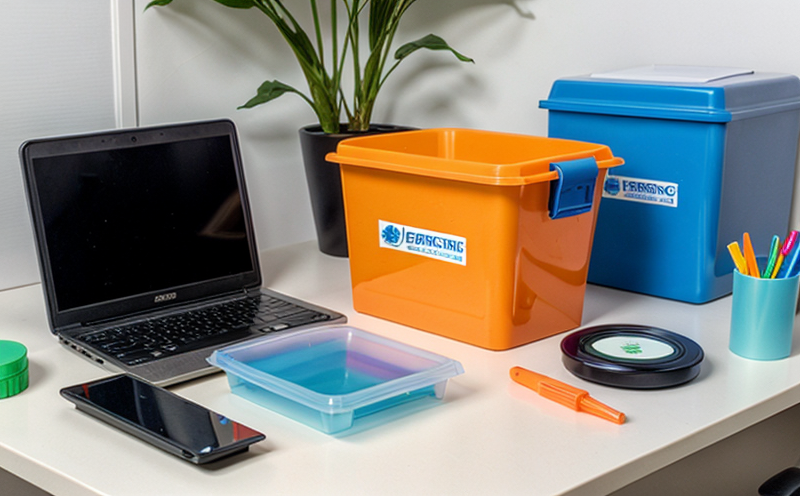IEC 62631 Dielectric Properties Testing of Office Plastic Components
The International Electrotechnical Commission (IEC) standard IEC 62631 is a comprehensive guide for testing the dielectric properties of plastic materials used in electrical and electronic components. This service focuses specifically on office plastics, which are often found in common stationery items like pens, rulers, and erasers. These plastics must be capable of withstanding various environmental conditions without compromising their integrity or performance.
The dielectric properties of a material are crucial for ensuring its suitability in electrical applications. The test parameters outlined in IEC 62631 include frequency response analysis, breakdown voltage testing, capacitance measurement, and dissipation factor evaluation. These tests are essential to determine whether the plastic component can maintain its insulating quality under specified conditions.
For office plastics, the dielectric properties must be stable over a wide range of temperatures, ensuring that these items remain functional even in varying environmental conditions. For instance, an eraser used in cold climates should not become brittle or lose its grip due to low temperatures, while a pen should continue to operate smoothly in humid environments.
The testing process involves the use of specialized equipment such as dielectric testers and frequency response analyzers. These instruments are designed to simulate real-world conditions that office plastics might encounter during their lifecycle. The specimens used for testing are typically cut from actual components or parts, ensuring that the test results accurately reflect the material's performance in a practical context.
The acceptance criteria for IEC 62631 dielectric properties testing of office plastic components are stringent and vary depending on the specific application. For example, a pen component must withstand high-voltage breakdown without compromising its mechanical integrity or causing any electrical shorts. Similarly, an eraser should maintain its insulating properties under conditions that simulate both high humidity and extreme temperatures.
Compliance with IEC 62631 is critical for ensuring the safety and reliability of office plastics in a wide range of applications. This standard helps manufacturers verify that their products meet international quality standards, thereby enhancing consumer confidence in the durability and performance of these items.
In addition to electrical safety, the mechanical properties of these materials are also crucial. The testing process ensures that the plastic components do not degrade under stress or environmental factors, which could lead to product failure. This service provides a comprehensive approach to ensuring that office plastics meet both dielectric and mechanical performance criteria.
Applied Standards
The IEC 62631 standard is widely recognized for its rigorous testing protocols, making it an essential tool for manufacturers of office plastics. This service aligns with the following international standards:
- IEC 62631:2015 - Dielectric properties of plastic materials used in electrical and electronic components.
- ISO/IEC 8479-1: Measurement of dielectric constants and loss factors of insulating liquids.
- ASTM D149: Standard test methods for dissipation factor and tangent delta of electrical insulation at commercial frequencies.
The use of these standards ensures that the testing process is consistent, reliable, and replicable across different laboratories. This consistency is vital for maintaining high-quality control in production processes and ensuring compliance with international regulations.
Industry Applications
- Manufacturing Quality Assurance: Ensures that office plastics meet the required dielectric properties, thereby enhancing product reliability.
- R&D Innovation: Facilitates the development of new materials and components by providing accurate test data.
- Regulatory Compliance: Helps manufacturers comply with international standards for electrical safety.
- Sustainability: Promotes the use of environmentally friendly materials that meet stringent quality benchmarks.
The results from IEC 62631 dielectric properties testing are critical for ensuring that office plastics perform consistently across different environments. This is particularly important for manufacturers who need to ensure their products can withstand various conditions without compromising safety or functionality.
Quality and Reliability Assurance
The quality and reliability assurance process involves several key steps:
- Sample Preparation: The specimens are carefully prepared from actual components to ensure accurate testing results.
- Test Setup: The equipment is calibrated according to the specified parameters of IEC 62631.
- Data Collection: The test data is collected and analyzed for compliance with the acceptance criteria.
- Reporting: A detailed report is generated, highlighting any deviations from the standards and providing recommendations for improvement.
The results of this service are crucial for maintaining high-quality control in manufacturing processes. They ensure that office plastics meet international quality benchmarks and regulatory requirements, enhancing product reliability and consumer trust.





